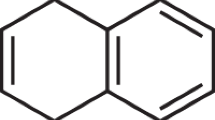Abstract
AN aromatic molecule may be characterized as one which can carry a ring current. This ring current is induced by an external magnetic field and can be observed by means of its large contributions to the anisotropy of both the diamagnetic susceptibility and the chemical shift. There is another observation which can be used for the same purpose and remains valid for radicals and ions. This is the anisotropy of the electronic g-factor. An unpaired electron, in a molecule or radical, has its spin oriented by the magnetic field which it experiences. This field consists of the external field together with the field at the electron due to induced ring currents of the other electrons. Since aromatic rings are usually planar this second field depends on orientation and results in an anisotropy. The g-factor, in this context, measures the ratio of the effective field to the external field.
This is a preview of subscription content, access via your institution
Access options
Subscribe to this journal
Receive 51 print issues and online access
$199.00 per year
only $3.90 per issue
Buy this article
- Purchase on Springer Link
- Instant access to full article PDF
Prices may be subject to local taxes which are calculated during checkout
Similar content being viewed by others
Author information
Authors and Affiliations
Rights and permissions
About this article
Cite this article
HALL, G., HARDISSON, A. Anisotropy of the g-Factor in Aromatic Molecules. Nature 198, 283–284 (1963). https://doi.org/10.1038/198283b0
Issue Date:
DOI: https://doi.org/10.1038/198283b0
Comments
By submitting a comment you agree to abide by our Terms and Community Guidelines. If you find something abusive or that does not comply with our terms or guidelines please flag it as inappropriate.



